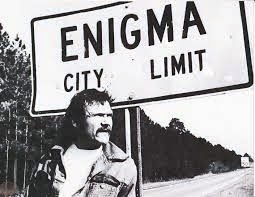When Harry Crews died in 2012, Elaine Woo in the Los Angeles Times wrote, [t]he word ‘original’ only begins to describe Crews, whose 17 novels place him squarely in the Southern gothic tradition, also known as Grit Lit. He emerged from a grisly childhood in Georgia with a darkly comic vision that made him literary kin to William Faulkner, Flannery O’Connor and Hunter S. Thompson, although he never achieved their broad recognition.
 In 1968, he began a long tenure on the University of Florida faculty. Woo
writes that "during his three decades there, he swore, drank and
generally fractured the academic mold. With piercing blue eyes set deep in his
craggy face, a limp caused by one or another violent encounter, a wardrobe that
ran to sleeveless T-shirts and denims, and an assortment of tattoos (including
one of a skull with a line from ee cummings, how do you like your blue-eyed
boy/Mister Death’), he looked like the type
of person one would cross the street to avoid meeting.
In 1968, he began a long tenure on the University of Florida faculty. Woo
writes that "during his three decades there, he swore, drank and
generally fractured the academic mold. With piercing blue eyes set deep in his
craggy face, a limp caused by one or another violent encounter, a wardrobe that
ran to sleeveless T-shirts and denims, and an assortment of tattoos (including
one of a skull with a line from ee cummings, how do you like your blue-eyed
boy/Mister Death’), he looked like the type
of person one would cross the street to avoid meeting. I have read most of his novels and
though I have to admit that they are not among my favorites, I will always have
vivid memories of each of them, for they are impossible to forget. How could I
forget a story about a man who sets out to eat an entire car, a Ford Maverick,
piece-by-piece (Car, 1972), or a
man who makes a living by knocking himself out (The Knockout Artist,
1988)?
I have read most of his novels and
though I have to admit that they are not among my favorites, I will always have
vivid memories of each of them, for they are impossible to forget. How could I
forget a story about a man who sets out to eat an entire car, a Ford Maverick,
piece-by-piece (Car, 1972), or a
man who makes a living by knocking himself out (The Knockout Artist,
1988)?His books never made the best-seller lists and that was because, as one critic wrote, in part because they bewildered some readers and repelled others. But he did develop a cult following, a huge, loyal one.
Maud Newton wrote:
"A Childhood, his autobiography, is by most critics' reckoning, his best work. A Feast of Snakes, a novel about a rattlesnake revival, comes close, exposing the hypocrisy and strange allure of Pentecostalism with an intensity matched only by Baldwin's Go Tell It On The Mountain."
His novels are a bit too bizarre for some readers, but that shouldn't cause them to shy away from A Childhood: The Biography of a Place, which is a straight forward account of the first six years of his life, and is just as memorable as his novels, and will always be one of my favorites.
The son of agricultural sharecroppers, he grew up in extreme poverty in south Georgia during the '30s and '40s. In 1937, when Crews was a small boy, his father died as the result of a heart attack. His description of what happened the night after his father was buried is one of the most devastating descriptions of grinding poverty that I have ever read:
"The night after the day daddy was buried, somebody went in the smokehouse and stole all the meat that had been cured and hung there before he died .... Mama knows who got the meat, not because she has any hard proof, but because in her heart she knows, and I know too, but the one who got it is himself lying in the same graveyard daddy's in and I see no reason to name him.
"He was one of my daddy's friends. I do not say he was supposedly or apparently a friend. He was a friend, and a close one, but he stole the meat anyway. Not many people may be able to understand that or sympathize with it, but I think I do. It was a hard time in that land, and a lot of men did things for which they were ashamed and suffered for the rest of their lives. But they did them because of hunger and sickness and because they could not bear the sorry spectacle of their children dying from lack of a doctor and their wives growing old before they were thirty."
Harry Crews life proved at least one thing: It is possible to overcome what appear to be the insurmountable odds of one’s childhood. How many people could have survived paralysis and a full body hot water scalding before age six? However, it should be added that only a few people – a mighty few – could have surmounted the odds he faced. But not only did he have to survive a harrowing childhood, he also had to survive an adulthood that would have finished off anyone who was not blessed with his iron will and intestinal fortitude.



No comments:
Post a Comment